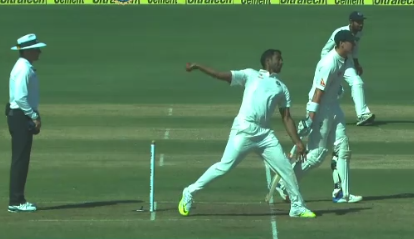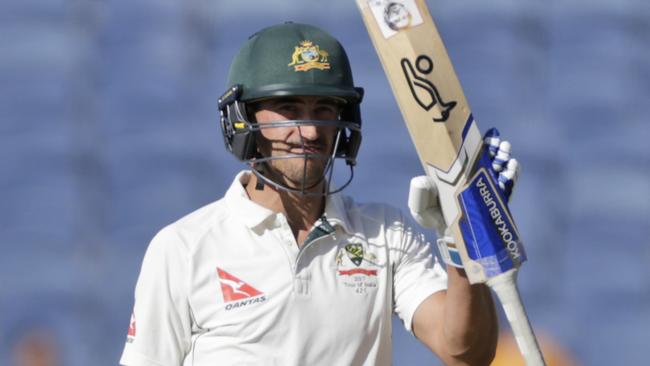Aussie Cricket
-
@Kruse said in Aussie Cricket:
@gollum I suspect the BCCI clouds my view a fair bit; and it's not so much the individuals - but just the team in general... the arrogance that comes with privileged Indians.
Yeah, I'm a bit more relaxed about the Indians.
England and Australia drove world cricket forever, and arranged it to suit themselves. Now the Indians generate 80%plus of all the revenue in the game, they're calling the shots. It sucks, but it's an important lesson for us all in life: if you're rich, you do what you farking want and everyone else bends over for you.
And yes, some of their supporters can be arse, but the revenue from BCCI effectively finances our first class game, so take the rough with the smooth.
-
Have zero issue with guys like Kohli - though I sometimes gnash my teeth when he's playing and doing well, he's a smart, aggressive cricketer with a classy game.
But there is preparing a home ground advantage, and then there is this bullshit. The sheer corruption also gets on my tits. Reading about tours in the past where, once India were getting beaten, the tournament prize money mysteriously went away.
-
@gollum said in Aussie Cricket:
While Starc, Wade, Warner & Smith are all utter cockholes. There's no one in the Indian team remotely close to Warner & Starc as assholes
I don't mind Smith, at all. He seems like a slightly unusual bloke, but I can't recall him doing anything particularly arsehole-ish. I can recall him doing a few good things - including more or less telling one of his players to pull his head in during a TV interview.
Davy, I can agree on - he seems to be on the top level of the pantheon of great Australian cricketing arseholes (with Michael Clarke).
It's hard to say about the Indian team. The concerted, vociferous appealing for things that are clearly not out is pretty annoying. And it works - though at least they're now using the DRS. Nonetheless, I'd argue Wade was a victim last night.
-
@Bovidae Both had a fair chunk of Timmy involved. The commentators were critical of both.
The lbw review against Smith was particularly bad. It was one that simply didn't look out to me when it happened and at best they were going to get an on-field call for the ball clipping. As it turned out it was hitting nothing.
As a matter of policy I don't think it's worthwhile reviewing lbws on line - in tests anyway - I think they've changed the rules a bit in at least one of the shorter forms, but I can't remember if it favours batsman or bowler.
-
@NTA said in Aussie Cricket:
@Chris-B. really it's about protecting the umpires, so I reckon if you're going to try and overturn a not-out LBW decision at this level, you'd better be pretty fucking confident
Same in Rugby now - at least that sped shit up significantly. Cricket DRS still sounds like talking to an anally retentive health and safety person.
-
@NTA Yeah. As a batsman I'd only review if I'd got an edge on it. As a bowler, only if I thought the decision was based around a non-existent edge.
It looks to me that the Aussies - Smith at least - has this well worked out. Ahead of some of the other teams. In particular, Smith was far better at reviews than BMac in the 6 test "series" we played.
In India it's very important to get this right, because you're going to have umpiring fuck-ups due to the umpires being put under intense pressure.
-
@nzzp said in Aussie Cricket:
Cricket DRS still sounds like talking to an anally retentive health and safety person.It does a bit, but I kind of like it because it shows that they are very systematically reviewing the evidence. At some point it will wear thin though and - like all these TV review systems - it sucks if you're at the ground and don't know what's going on - especially if there's no big screen.
-
@Chris-B. said in Aussie Cricket:
@NTA Yeah. As a batsman I'd only review if I'd got an edge on it. As a bowler, only if I thought the decision was based around a non-existent edge.
It looks to me that the Aussies - Smith at least - has this well worked out. Ahead of some of the other teams. In particular, Smith was far better at reviews than BMac in the 6 test "series" we played.
In India it's very important to get this right, because you're going to have umpiring fuck-ups due to the umpires being put under intense pressure.
Things might be a bit different in India but I think this is generally a really bad strategy. In the history of test cricket, only 30% of wickets have been reviewable. What that means is that only 30% of dismissals in cricket are LBW or caught behind. That means that in an average innings a batting team should probably only need 3 reviews anyway. If your innings lasts more than 80 overs then you get 4 reviews - which is more than you should ever really need. It is tempting to save reviews up but reviews become less valuable as the innings continues. You want to use your reviews on the best batsmen.
If someone gets out LBW and your team has two reviews left and they are an established batsman then they should pretty much always review. There's often a good chance you won't have another LBW given to the 80th over. Up until the 60th over you probably want to keep at least one review in hand for the obvious nicks. Apart from that you should be taking a punt unless you are 100% confident you were plumb. From a batting perspective, reviews aren't really a scarce resource.
From a fielding perspective, it is completely different. There are many shouts you could review but have to choose not to.
-
@hydro11 said in Aussie Cricket:
If someone gets out LBW and your team has two reviews left and they are an established batsman then they should pretty much always review.
Kane talked Brownlie out of reviewing his LBW decision, which replays showed was missing leg stump.
-
@hydro11 You'd presumably also need to include slip catches and catches at short leg and otherwise close to the wicket in your reviewable list. I also think - anecdotally - since the DRS was introduced, that umpires have realized that spinners actually get lot more lbws than they were previously given - so there's been a change in how those are umpired.
Obviously, there's tactical situations where you might as well just "review and hope", but I thought it would be a bit "Aspergersy" to list them all.

@Bovidae In ODIs I think my rule applies even more. Good policy call from Kane - even though technically it wasn't a good call!
-
Mitchell Starc is just a handful of runs away from overtaking vice-captain David Warner as the leading Test run-scorer on Indian soil among Australia’s current XI.
Starc’s rearguard, unbeaten 57 from 58 balls included five fours and three sixes, with 49 of his runs coming in an unbeaten tenth wicket stand of 51 with Josh Hazlewood (1 not out).
Incredibly, his 202 Test runs at 50.50 apiece in India is just 31 shy of David Warner’s total of 233 and ahead of captain Steve Smith’s 188.
Thursday’s 57 was his second highest score in India, trailing his 99 in Mohali in 2013. He also made scores of 3, 8 and 35 in that series.
Starc has also been in imperious Test batting form this season, hitting three half centuries in his past five innings to push his average above 25 and career aggregate past 1000 runs.
Such commanding numbers in Australia’s fragile lower order begs the question, why is he not given stronger consideration as the solution to Australia’s ‘all-rounder problem’?
According to ICC rankings prior to this Test, Starc was the world’s seventh highest ranked all-rounder in the five-day format, one position ahead of Stuart Broad and three behind Ben Stokes.
His Test batting record also compares favourably to current number six Mitchell Marsh (630 runs @ 22.50) and the most likely all-rounder to be selected if changes are desired, Glenn Maxwell (80 runs @ 13.33).
-
Still a c*nt tho
-
@Bovidae said in Aussie Cricket:
@hydro11 said in Aussie Cricket:
If someone gets out LBW and your team has two reviews left and they are an established batsman then they should pretty much always review.
Kane talked Brownlie out of reviewing his LBW decision, which replays showed was missing leg stump.
That was in an ODI though. ODI's you only have one review so it is a bit different. If Brownlie had reviewed there was still Taylor and Williamson our two best batsmen to come. Having said that, there is little point in saving a review in an ODI. Wickets in hand become progressively less important as the game continues. If you still have a review left after 25 overs I would be using it at my next available opportunity. It's not that important in the 50th over if you get a howler.
-
@Chris-B. said in Aussie Cricket:
@hydro11 You'd presumably also need to include slip catches and catches at short leg and otherwise close to the wicket in your reviewable list. I also think - anecdotally - since the DRS was introduced, that umpires have realized that spinners actually get lot more lbws than they were previously given - so there's been a change in how those are umpired.
Obviously, there's tactical situations where you might as well just "review and hope", but I thought it would be a bit "Aspergersy" to list them all.

@Bovidae In ODIs I think my rule applies even more. Good policy call from Kane - even though technically it wasn't a good call!
That's true. It's quite rare that I see a slip catch reviewed. Slip catches aren't such an issue because most of them happen early in an innings anyway (or after a 2nd new ball is taken). Catch at short leg is possible in India, I suppose. Most of the time I don't see the point in not reviewing with two reviews left. A caught behind should be an obvious call so you should be fine. I just can't remember an instance of a batting team in test cricket running out of reviews and that team being negatively affected by it. I'm sure it's happened but it's rare. There are plenty of examples when a not out batsman doesn't review.
Shane Watson got a lot of stick for always going for reviews but other batsmen have probably cost their team more by not going for reviews.
-
I should also point out that the actual number is probably a fair bit lower than 30% of wickets being reviewable. A few lbw wickets come from a player being given not out and the fielding side challenging. In that situation obviously the batsman doesn't have to make a decision to review.



